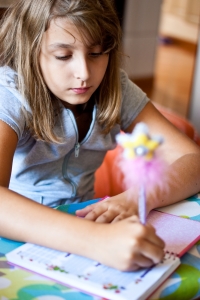Editor’s note: This post was originally published on September 15, 2008, and examines how the author has adapted Attachment Parenting International’s Eight Principles of Parenting as her children grew out of the infant/toddler years.
 My kids are not babies. They sleep in their own rooms. They don’t breastfeed. If I wore them in a carrier, the sling would rip and my spine would snap. They have homework.
My kids are not babies. They sleep in their own rooms. They don’t breastfeed. If I wore them in a carrier, the sling would rip and my spine would snap. They have homework.
Does Attachment Parenting still pertain to me?
Sometimes it seems as though the API’s Eight Principles of Parenting are geared mainly toward babies and toddlers: have the family bed, use the sling, breastfeed, don’t spank your exploring toddler and it’s all good. But what happens when those babies grow up? Do the principles apply to my family?
Absolutely!
Here is how I apply the API Principles into my own life.
Since my child-bearing years are behind me, obviously there’s no pregnancy or childbirth to prepare for! But even though my kids are older, l:
- Continually educate myself about developmental stages. They’re older, but they’re still growing and changing and have specific developmental needs.
- Set realistic expectations for themselves and for me. I don’t want to set my kids up for failure by expecting tasks that they are not developmentally ready to handle!
- Research different educational options and find the one that best suits my kids and our family. I closely monitor their schooling experience and advocate for them.
- Learn about their individual learning style, using that knowledge to help their educational experience.
- Nurture their natural desire to learn by helping them develop their interests. I follow their lead and explore topics they find interesting. I don’t push my own interests on to them, but help them foster their own.
2.) Feed with Love and Respect
My kids have been weaned for quite awhile. How do I continue feeding them with respect? I:
- Provide nutritious food that’s easily accessible, and educate my kids on the importance of eating healthy foods.
- Am their role model for healthy eating. I don’t have a rule about “grownups can eat this, but kids can’t.” What’s healthy for one is healthy for all. I hold myself to the “5 a day” veggie rule just as the kids are held to it.
- Make sure my kids have plenty of opportunities for physical activities. They don’t have to be organized sports or formal lessons: just running around the backyard is great for them, too!
- Make dinnertime a formal event at my house. No TV, no books, no toys. We eat at the table, and we talk.
All kids — and adults — have emotional needs! How do I respond positively to my children, when they have the words and means to tell me what’s wrong? I:
- Nurture a close connection and respect my child’s feelings. I can understand that instances that may have happened while I was not there — in school, for example — can impact their life at home, and is no less important.
- Ask my children about their day using specific questions: What was the hardest question on the quiz? What funny thing happened today?
- Respect my children when they say they need time alone. I give them time to transition from their school day to home.
- Show interest in my child’s activities and participate enthusiastically! I attend all recitals, games and meets.
I think this is the one the stays the same all throughout the child’s life! I:
- Give frequent hugs, snuggles and back rubs. My husband wrestles and tickles but only when our kids want him to. We use playfulness and games to encourage physical closeness.
- Hold my kids on my lap, since I find them way too heavy to carry for any length of time! We also snuggle side by side!
5.) Ensure Safe Sleep, Emotionally and Physically
The kids have their own rooms. They sleep all night, as do I — which is glorious after those baby years! Is nighttime parenting still on the table? Yes it is! I:
- Read bedtime stories to my kids and provide extra cuddles.
- Have a specific routine for bedtime that never wavers, which helps calm them down for bed.
- Have regular and set bedtimes during the school year. I want my kids to be well-rested, so they can learn the next day!
6.) Provide Consistent and Loving Care
Obviously since kids are in school, I can’t be in their lives as constantly as I was before. But I can still be there consistently by:
- Being available, which makes kids feel safe, secure and cared for.
- Avoid the “latch-key” temptation and find appropriate supervision between the time my children arrive home from school and I am home from the workday.
7.) Practice Positive Discipline
As children age, discipline also changes. Redirection no longer works! So, I:
- Stay emotionally connected to my children, which creates trust and love in them for their parents, making them generally easier to discipline. Quite honestly, discipline has never been a problem in our home. Connected children are internally motivated to please their parents most of the time.
- Use natural and logical consequences to teach children, which are more effective than punishment, and doesn’t instill fear.
- Use active listening.
- Do not use mockery, shaming or coercion.
- Do not bribe or offer rewards, as I want my children to develop inner self-control.
8.) Strive for Balance in Personal and Family Life
It can be so tempting to sign my kids up for music lessons, sports teams, and playdates, and to send them to every single birthday party to which they are invited. It’s hard to maintain balance with older kids! We:
- Don’t overdo extra-curricular activities. I refuse to schedule activities during dinner, and weekend extra-curriculars are very rare. Weekends are family time for us.
- Eat dinner together, everyday.
- Participate in our own family traditions and discuss them with the kids.
- Take the kids out on dates with one parent or the other. A movie or lunch out with just one kid and one parent is a lot of fun and increases bonding.
- After the kids are in bed, my husband and I watch movies or talk. Admittedly, my husband and I don’t go out much by ourselves very often. This could probably be improved for us.
As my children have grown and changed, my parenting has grown and changed. Attachment Parenting is different for us now than it was when my first was a baby.
How has it changed for you?


